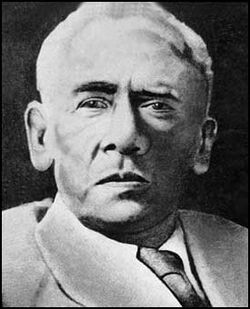Biography:Syamadas Mukhopadhyaya
Syamadas Mukhopadhyaya | |
|---|---|
 Syamadas Mukhopadhyaya | |
| Born | June 22, 1866 Horipal block, Hooghly district, Bengal Presidency |
| Died | June 8, 1937 (aged 70) |
| Nationality | Indian |
| Alma mater | Calcutta University |
| Known for | Mukhopadhyaya's theorem, Four-vertex theorem, Non-Euclidean geometry, Differential geometry |
| Awards | Griffith prize |
| Scientific career | |
| Fields | mathematics |
| Institutions |
|
| Thesis | Parametric Coefficients in the Differential Geometry of Curves in an N-space (1910) |
Syamadas Mukhopadhyaya (22 June 1866 – 8 May 1937) was an Indian mathematician who introduced the four-vertex theorem and Mukhopadhyaya's theorem in plane geometry.
Biography
Syamadas Mukhopadhyaya was born at Haripal, Hooghly district, in Bengal Presidency, British India. He graduated from Hooghly College, received his M.A. degree from Presidency College in Calcutta, and his Ph.D. degree from Calcutta University in 1910. He also took classes from the Indian Association for the Cultivation of Science.[1]
Mukhopadhyaya was appointed by Asustosh Mookerjee as professor of mathematics in the Rajabazar Science College, University of Calcutta.[2] Jacques Hadamard communicated with Mukhopadyaya about the latter's work on the geometry of a plane arc[3] and Wilhelm Blaschke's book on geometry had a reference to Mukhopadhyaya.[4]
He worked at Bangabasi College and then at Bethune College in Calcutta, where he lectured in Mathematics, English Literature, and Philosophy. In 1932, he was elected president of the Calcutta Mathematical Society. He served in this capacity until his death from heart failure in 1937. Mukhopadhyaya went to Europe on a Ghose Travelling Fellowship in 1933 to study methods of education. He gave lectures in Paris University.[5]
References
- ↑ History of the Calcutta School of Physical Sciences
- ↑ Sources in the Development of Mathematics: Series and Products from the Fifteenth to the Twenty-first Century
- ↑ Collected geometrical papers of Syamadas Mukhopadhyaya, Volume 1
- ↑ Calcutta Review 1934
- ↑ The Mathematics Student, Volumes 1-4, 1933
- Chaki, M. C. (1990), "Syamadas Mukhopadhyaya (1866–1937)", Journal of Pure Mathematics 7: 59–65
- Mukhopãdhyãya, S. (1929), Collected geometrical papers of Syamadas Mukhopadhyaya, Calcutta University Press, https://books.google.com/books?id=TBvOAAAAMAAJ
- "Syamadas Mukhopadhyaya", Bulletin of the Calcutta Mathematical Society, Vol. 29 (1937), pages 115-120.
- D. DeTurck, H. Gluck, D. Pomerleano, D.S. Vick, The four vertex theorem and its converse, Notices of the AMS, 54 (2007), no. 2, 192–207.
 |

